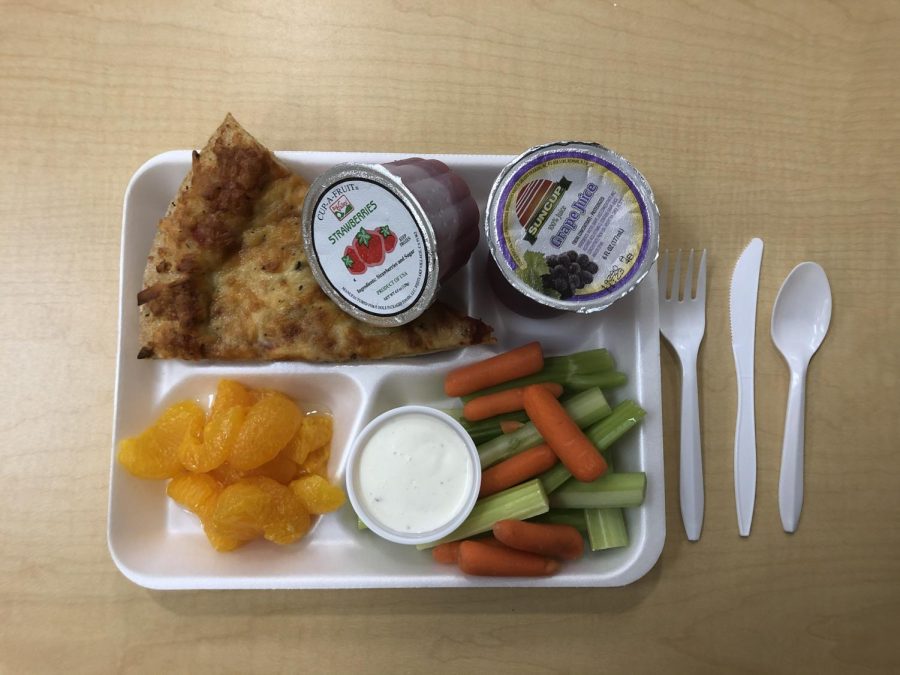School lunches change under the Trump administration
PHOTO Gracie Warda
A daily lunch from the Fenton High cafeteria.
December 6, 2019
As of May, 2017, the Trump administration planned to relax the former Obama-era regulations on school lunches; the new ones were enacted that July. Since then, schools and communities have experienced the effects of the new regulations. These effects, however, have created controversy that is spreading across the country.
According to New York Times Writer Julia Jacobs in an article titled Trump Administration Rolls Back Obama-Era Rules for School Lunches, “The United States Department of Agriculture announced its final plans to lower nutrition standards for grains, flavored milks and sodium in school cafeterias that were part of the Healthy, Hunger-Free Kids Act of 2010 that Michelle Obama had advocated. The Obama-era rules required that schools must serve entirely whole grain-rich foods, meaning that the product must contain at least 50 percent whole grains. “Under the new rules,” Jacobs said, “Only half of the grain products on the cafeteria’s weekly menu must be whole grain-rich.”
These new regulations cut down the cost of making school lunches and made it easier for schools to meet the national standards while allowing students to enjoy their meal. This however, has its side effects.
Washington Post Reporter Moriah Balingit said in Trump administration rule could end free school lunches for about 500,000 children “nearly one in seven children came from households that were considered “food insecure” in 2018,” meaning that they lack reliable access to a sufficient quantity of affordable, nutritious food. “Recognizing that many households rely on schools for food, some school systems have begun feeding their students through the summertime. About a half-million students could lose access to free school meals [because of the new laws and other proposals like the limited food stamp proposal], drawing protests from congressional Democrats who say it could harm needy school children.”
Said protests arise from not only the public, but also from the government itself. Many congress members are concerned for the long-term effects that the new regulations will have on students.
The Democratic members of the House Committee on Education and Labor wrote in a letter to the Trump administration that “both the Supplemental Nutrition Assistance Program (SNAP) and school meals programs are critical in combating food insecurity among children. By cutting these programs, the proposed rule would worsen child food insecurity, with detrimental effects on children’s academic outcomes, health and more.”
For Fenton Area Public Schools (FAPS), the new regulations don’t bring too much change as the schools have been able to meet the requirements in the past.
“We have not made many changes at all,”Food Service Director Anna Goss said.“I think these relaxed regulations are a step backwards.”
FAPS has been devoted to making a healthy meal for the students, therefore, students are eating healthy foods and learning through positive influence and encouragement.
FAPS Wellness policy states that “our school district is committed to serving healthy meals to children, and to meeting the nutrition needs of school children within their calorie requirements. The school meal programs aim to improve the diet and health of school children.”
Controversy over these new rules isn’t as popular in the Fenton area due to FAPS’ ability to provide other services for those who need them.
“We have been able to offer Universal Breakfast (free breakfast) at the elementary grade level,” Goss said. “We also participate in the Summer Food Service Program which offers free breakfast and lunch to all children under the age of 18 during the summer. Our program has won the Turnip the Beet Award for high-quality summer meals each year since the United States Department of Agriculture (USDA) created the award. We are always looking to improve our already great lunches with cleaner product labels, fresh ideas and new menu concepts.”
All in all, school lunches are more relaxed under the Trump administration. Fenton schools will continue to change over time, because of new codes and regulations, and growth.












